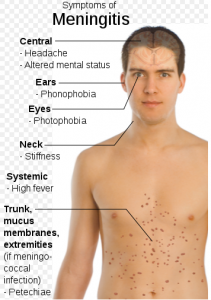An unnamed University of Oregon student has been diagnosed with Neisseria meningococcemia. The student lived off-campus.

Meningococcal infection caused by the bacterium, Neisseria meningitidis contagious and can progress very rapidly. The bacteria are spread person-to-person through the air by respiratory droplets (e.g., coughing, sneezing). The bacteria can also be transmitted through direct contact with an infected person, such as kissing or sharing cups or utensils.
It can cause serious meningitis and/or blood stream infections.
University of Oregon staff has been working closely with Lane County Public Health officials to identify individuals who may have extended exposure to the patient. According to Lane County Public Health, the risk of transmission is considered to be quite low. In order for the illness to spread, a person would need to have close contact with the patient for four hours or more over the past seven days.
According to the Register-Guard, The university has contacted about 800 of its students and staff, whom they believe have been in contact with the sick student in classes and in extracurricular activities since the school term began on Jan. 5.
Those who have had close contact of at least 4 hours cumulatively within one week are being provided with a preventative medication to further reduce their risk of becoming ill.
Many people in a population can be a carrier of meningococcal bacteria (up to 11 percent) in the nose and back of the throat, and usually nothing happens to a person other than acquiring natural antibodies.

Image/CDC
Symptoms of meningococcal disease often resemble those of the flu or other minor febrile illness, making it sometimes difficult to diagnose, and may include high fever, severe headache, stiff neck, rash, nausea, vomiting, fatigue, and confusion. Students who notice these symptoms – in themselves, friends, or others – especially if the symptoms are unusually sudden or severe, should contact their college health center or local hospital.
If not treated early, meningitis can lead to death or permanent disabilities. One in five of those who survive will suffer from long-term side effects, such as brain damage, hearing loss, seizures, or limb amputation.
Meningococcal vaccines protect against most types of meningococcal disease.
Related: Meningitis B vaccine, Trumenba, receives FDA approval: 1st in the US


3 thoughts on “University of Oregon student diagnosed with Neisseria meningococcemia”